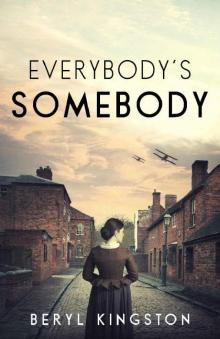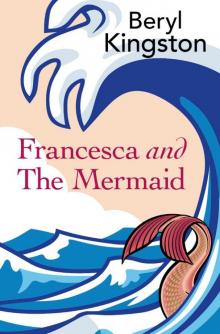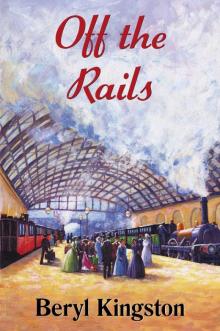- Home
- Beryl Kingston
Hearts and Farthings Page 3
Hearts and Farthings Read online
Page 3
‘Except for Peppi,’ Oreste said, opening his eyes to look sadly at his brother.
‘Yes. Poor little Peppi,’ Pietro said. They both wore sad expressions as they remembered Peppi, whoever he was, and the Belinda May rolled sickeningly on towards Gibraltar. Alberto felt obliged to shove the conversation along.
‘What happened to Peppi?’ he asked.
‘Drowned!’ Pietro said, beginning to giggle. ‘In the ice cream. Before it set, of course. Well it was his own fault really. He shouldn’t have been so greedy. We found him in the morning, set fast.’
‘Poor thing!’ Alberto said, and then, as another thought struck him, ‘What a dreadful waste of ice cream.’
‘No, it wasn’t,’ Pietro said. ‘We didn’t waste a mouthful. Cut him out. Very neat job we made of it. Tidied up the hole and sold the rest. New flavour! Capuchin monkey! Made a change from vanilla. We were sold out in an hour.’
‘You’re joking!’ Alberto said. But sometimes it was difficult to tell.
Pietro had such a deft way with conversations. He seemed to be able to turn them in any direction he wished. Alberto admired and emulated. By the evening of the sixth day, he’d learned the trick of questioning that would provoke confidences, and so far, he’d managed to avoid revealing anything much about himself. It was necessary at this stage of his life to stay hidden and protected, if he could. But on the evening of the sixth day he was caught out.
He and Oreste were squatting in the doorway of the Chiapponcelli berth smoking sleepily. Ettore was still entombed and still grumbling, even in his sleep, but at least he wasn’t being sick. The rhythm of the ship was almost pleasant, and Alberto was drifting into a speechless languor when Pietro arrived.
‘Gibraltar coming up!’ he said to Alberto. ‘Come and see it.’
Alberto said ‘Um’ without moving and without opening his eyes. What was Gibraltar to him in his present state of peaceful satisfaction?
‘Come on, you lazy lump,’ Pietro said, prodding him with the toe of his boot. ‘It’s a sight worth seeing. And you might miss it on your way back. The Geogio goes through at night.’
‘I’m not coming back,’ Alberto said. ‘I’m staying in England.’
‘Never!’ Pietro said. ‘Emigrating do you mean?’ There was a note of interest and disbelief in his voice that made Alberto regret his quick answer. He felt exposed. He got to his feet quickly.
‘What’s it like, Gibraltar?’ he tried.
The brothers followed his feet but ignored his words.
‘You can’t emigrate,’ Oreste said. ‘Nobody leaves Italy forever.’
‘I have,’ Alberto said. ‘Forever!’
‘You’ll come back,’ Pietro said. ‘You won’t stay in England for long. I’d bet money on it.’
‘Have you got a job in England?’ Oreste asked. ‘Or are you just chancing your luck? It’s not a good place to be out of work, you know. The poor starve.’
‘And you can’t live off the land,’ Pietro said darkly, ‘because there isn’t any. They’ve covered it with brick and plaster.’
They emerged on deck. It was already dusk and the light on the galley was like a little white eye. Under cover of half-light it was possible to avoid telling the exact truth. ‘I’m going to work with my cousin,’ Alberto said. ‘He has a shop. He sells food. In London.’ It sounded good. He could almost believe it himself.
‘Well, that’s different, young Alberto,’ Oreste said. ‘Is it a big shop?’
‘I don’t know,’ Alberto said, trying to be honest.
‘What does he sell?’ Pietro wanted to know.
Alberto tried to remember what his cousin had written. He had a vague recollection that apples and potatoes had been mentioned. ‘Fruit,’ he said, ‘and vegetables.’
‘And pasta?’ Oreste suggested.
‘I expect so,’ Alberto said. ‘And cheeses too, probably.’ He was forming a vision of this shop, crammed to the ceiling with the good fresh Italian foods he was beginning to miss. ‘Tomatoes,’ he elaborated, ‘and olives and grapes and eggs.’ His mouth was watering.
‘It sounds like a fine big store,’ Oreste said. ‘If you’ve got a job there your future is made. There’s only one thing better than selling food in England, and that’s selling drink. The English drink like fishes. Well, there’s Gibraltar.’
The rock loomed to starboard, huge and grey-blue. To Alberto it looked very much like any other rock. He couldn’t see why he should have been dragged up onto a cold deck to look at it, especially now that his mind was filled with the vision of Camillo’s magnificent store.
‘What’s so special about Gibraltar?’ he asked the brothers.
‘My word, you are innocent,’ Pietro said. ‘It’s the end of the known world, that’s all. From now on we’re among foreigners. From now on everything changes.’
He was certainly right about the change. At two o’clock the next morning they hit bad weather. From that moment on, all conversation came to a halt, and so did sleeping, cooking, eating and even standing upright. For the next forty-eight hours everybody aboard was fully occupied fighting the storm. Alberto woke to find that his plunging, scudding world had been completely altered. The pulse of the water beneath them had become a deafening roar while above him the wind was screaming through the canvas like a demented spirit, and somebody was shrilling a whistle. The whole ship was juddering and vibrating with a violence he’d never felt before, shaking with effort, like a wild creature pitting its strength against a predator. He knew they were only going about, but he was shaken and excited by the extreme force in this now familiar sensation. There was an exhilaration and crackling sense of danger all round him. It drove him immediately from the bruising sides of his rolling cabin and up into the theatrical darkness on deck. Whatever it was, he wanted to be part of it, particularly if it was dangerous.
It was black as pitch up there and the deck was slippery and treacherous under his bare feet. He found a guideline quickly and clung to it, glad that he knew where it was. Lights appeared briefly out of the murk before him, swung, tipped sideways and disappeared as the Belinda May bucked and reared like a monstrous frantic horse. He could see very little of the ship and nothing at all of the sea and sky, but the power of the storm was palpable. The unseen breakers of the Atlantic thundered down upon them from every side, hissing over the bows in a swirling torrent of white-needled spray, while all around him heavy air roared and beat like an engine, knocking him off his feet, pushing the breath back down his throat and obscuring what little vision he had with sudden flurries of stinging salt water. After a few seconds his eyes adjusted to the darkness. Now he could make out the ghost-white flicker of the shrouds and catch a glimpse of the masts as they rolled across his line of vision.
Pietro was a warm shape at his elbow, shouting words he couldn’t hear into the howling air. Stumbling in and out of the enveloping blackness were the shadows of the crew, toiling and gleaming in the flickering lights. All four of them were on deck, the taciturn Ben and Young Tom in the bows, and the Master and Old Tom fighting the wheel. After several glances at the shifting darkness above his head, Alberto realised that most of the sails were already reefed. Only the jibs and the two mainsails remained, and it was their canvas that was screaming alarm.
He turned his head towards Pietro’s black outline and had just opened his mouth to shout at him when they were both engulfed in a mass of sea water that fell down upon them with such force that Alberto felt as if his bones were giving way. The next few seconds were a confusion of fear and action and terrifying sound, rending, grinding and screaming. He fought the pressure of the black water with all his strength, but it forced him down, flailing and battered until he was pinioned on the deck. He couldn’t draw breath, and he couldn’t open his eyes. He tried to twist his body away from the weight of the wave to relieve the pain in his lungs. Then the water was dragging away, pulling him with it down the slope of the deck with a roaring hiss that filled his ears with pressure.
He grasped wildly as he fell, and his hands found a rope and clung to it, burning and desperate, while the rest of his body went on fighting, almost automatically as though it no longer belonged to him, struggling up towards the lifeline until he was entirely curled around it, clinging with arms and legs like a monkey, breathing fast and with his eyes still tightly shut.
Somewhere to his right he could hear Pietro calling, ‘Are you there, Alberto? Alberto?’ and he answered quickly ‘Yes, yes. Where are you?’ Then the sea roared again, the words were lost, and the deck swung beneath his feet like a bell. Above his head a sail was flagging like a great broken bird, and somewhere below him Young Tom was shrieking. A rope trailed down towards his hands out of the wetness, and he caught at it instinctively as it passed and held on. Ben was beside him, legs wrapped around the guidelines, tugging on the same rope, then Pietro, then Young Tom. Without words they found a common rhythm and pulled together, flexing themselves against intolerable weight. The rope was like a live thing and as powerful as the storm. It lifted all four of them with ease, rising and flailing above their arms; then without warning it slackened and seemed to relax for a second, so they were able to hand it in, just a little, before it rose in full power again.
Alberto worked without being fully aware of what he was doing. He knew the sail above them was ripped. Now and then, in a clear second after a blink, he saw the torn length of canvas kicking into the black sky above them, and he knew from the fear and excitement around him how vital it was to bring it down, but things were happening too quickly. It was only after the sail had finally been hauled out of the tumult and reefed at last that he realised the danger they had all been in, and even then, the next breaker was already crashing down upon them.
The Belinda May rode the storm all night and Pietro and Alberto fought it out alongside the crew. There was no dawn for any of them. The peaceful division between night and day had been obliterated by the tempest; pitch black sky gradually became a low, shifting mass of bruised cloud, grey, black and purple: pitch black sea was terrifyingly revealed as a solid wall of slate grey water towering and toppling inexorably towards them. The horizon no longer existed. Time had no meaning. There was nothing but the menace of that close-pressing sea and the terror in the trough of the wave.
Alberto did as he was told, stayed on his feet and worked so far beyond fatigue that by the time the first lull in the storm gave them a chance to catch their breath, he was almost incapable of thought. Miraculously Young Tom managed to make coffee and to pass half a mug of it to everyone on deck. Alberto gulped his gratefully but without being aware of hunger or thirst. He was functioning on instinct and observation alone. He reacted, and he watched. And the man he watched most closely was the Master. All the other men on deck showed strain or fear, however much they were trying to hide their emotions. Young Tom was the worst, with bolting eyes and a face strained under taut grey skin; Old Tom kept calm, but the occasional quick squint he gave towards a sudden shift or a particularly ugly wave was more revealing than he knew; Ben’s lips were chapped and bitten; Pietro seemed darker than ever and had developed a new habit of tucking his head down towards his chest to keep his fear out of sight. Only the Master was unchanged. He moved about the ship like a soft-footed shadow, partly obscured by driving rain and a haze of flung spray, but always there, controlled and contained. Any change of wind direction, any new danger produced immediate activity, but no sign of fear. He seemed to be digesting the storm and making sense of it, and his calm gave Alberto an ineffable sense of security. No matter what happened he knew they would all survive. As the heavy walls of water crashed down towards the Belinda May his heart was racing with excitement and exaltation. ‘Do your worst!’ he yelled at the riot all around him. ‘You can’t beat me! I won’t drown, and I won’t give in! I’ve got you beaten! I’ve got you all beaten! I am Alberto Pelucci. You can’t kill me!’ And the waters rolled away under the ship, leaving the growling sky, purple and engorged in its place, and neither had harmed him.
The third lull in the storm brought sufficient light to see by and allowed speech to be heard for the first time in hours.
‘What a night!’ Pietro shouted to Alberto.
‘I think it’s day,’ Alberto shouted back.
‘It’s been going on a long time, whatever it is,’ Pietro yelled, grabbing at a line for support. ‘Time slips at sea like the rest of us!’
Young Tom cooked a stew and two by two they staggered down to the saloon to eat it as best they could on a table rocking violently and unpredictably. Then the storm increased, and they were all fully engaged on deck.
Soon it was growing dark again but whether this was because night was approaching or because they were in for even worse weather, Alberto neither knew nor cared. He felt he’d been working the bilge pumps for most of his life now and would have gone on until he dropped, if Old Tom hadn’t stopped him.
‘You’re all in!’ the old sailor said, putting a hand on Alberto’s wet arm. ‘You cut off an’ get some shut-eye, me dear.’
The sense of what he was saying was obvious even though the words themselves were foreign. Their effect was immediate. They released Alberto’s fatigue from the confines of his excitement. He felt like a balloon that had suddenly been deflated. He was too tired even to answer. He crawled down the companionway, hanging onto the rail like a man weakened by long illness, and fell into his berth. Hardly aware of what he was doing, he stripped off his soaking clothes, wrapped himself in a blanket and was asleep the moment his bones touched the mattress.
When he woke it was daylight and the storm was over. The Belinda May was humming through the water, and he could smell coffee brewing. He crawled stiffly through his porthole and picked up his shirt and trousers. They were both running with water. His palms felt sore against the rough, wet material and when he examined them, he saw to his surprise that they were criss-crossed with deep grazes, and thick red weals. Just looking at them made him aware that they were really quite painful and yet he hadn’t noticed them at all until that moment. He was still considering the mystery when Pietro arrived with an old pair of canvas trousers and a very holey jersey.
‘Put these on,’ he said, tossing the clothes at Alberto. ‘Domenico left them behind last year. They’re not exactly beautiful but they’re better than nothing and you won’t be wearing any of that lot today,’ and he kicked the pile of streaming clothes at their feet.
In fact they took three days to dry out. Alberto didn’t mind a bit. He rather fancied himself in his borrowed outfit. Even the fact that it was torn and dishevelled only gave it an extra touch of romance. It suited the new life he was living. For the first time since his mother died, he was proud of himself and the way he’d behaved. He’d come through the storm without being sick and without making a single mistake. It was a triumph. He’d made new friends and he’d found a man to admire and emulate. The calm and strength of the Master had impressed him on the very first day, but now that he’d watched his stoical handling of a tempest, he had come to a decision. He wanted to be like the Master. And it was possible. He felt sure it was possible. The change in him had already begun. Now all he had to do was to let it develop, to calm his excitable nature, quell his temper and keep his emotions under control. By the time they reached London, he would be a new man.
The rest of the journey was steady and almost uneventful. They sailed through two more storms, but after the massive impact of the first one they hardly noticed them. Young Tom’s cooking improved, the torn sails were stitched together, cuts gradually healed, and bruises faded. Alberto learned a lot more English, Pietro remembered another song and on the twelfth day Ettore stopped being seasick, had his first wash and joined them on deck. The voyage was nearly over.
Then the empty waters of the Atlantic were left behind and they were in the busy English Channel, enlivened by a plethora of trade and traffic. They passed battered fishing fleets and lone trawlers heading out towards the fishing banks and were passed in their
turn by steamboats and merchant men, and once by a tall clipper resplendent under full sail. And at last came their first sight of land, a row of needle-sharp cliffs and the frothing shore-line of a green island. Behind it, low hills lay blue in the distance, under banks of complicated cloud that billowed one over the other, dove grey on lilac, cream tinged with apricot, blue edged with white, merging, enlarging and shredding, now trailing an abrupt grey fringe of rain, now puffing into the upper reaches of the sky like smoke from an engine. Alberto was intrigued by such a manifestation of natural power; a display of force no puny human could match or tame. It had the same inexorability as the sea and excited him in the same way.
By the time they reached the mouth of the Thames he was trembling with anticipation again, despite his vow to model himself on the Master. When they dropped anchor and settled down to wait for the pilot, he prowled the decks with impatience. Ships from every part of the world lay at anchor waiting to approach or were edged gently into the new docks ahead of them. Thames barges, heavy with hay, bellied their brick red sails towards the city. The skyline fluttered with sails: the mud-brown river frothed with moving hulls. He couldn’t control his excitement.
‘Come on! Come on!’ he said, his mouth working with impatience. ‘What are we waiting for?’
‘We’re nearly there,’ Oreste comforted. ‘We should be docked before evening.’
Before evening! Alberto thought. It couldn’t be true. It couldn’t possibly take all that time to get from the estuary to the city.

 Everybody's Somebody
Everybody's Somebody Sixpenny Stalls
Sixpenny Stalls Francesca and the Mermaid
Francesca and the Mermaid Avalanche of Daisies
Avalanche of Daisies Tuppenny Times
Tuppenny Times A Time to Love
A Time to Love Octavia's War
Octavia's War Gemma's Journey
Gemma's Journey London Pride
London Pride Gates of Paradise
Gates of Paradise Octavia
Octavia Off the Rails
Off the Rails Maggie's Boy
Maggie's Boy Fourpenny Flyer
Fourpenny Flyer